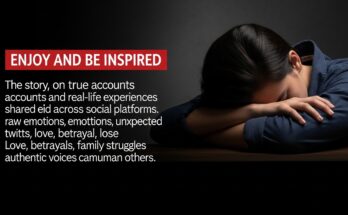At nine, he watched his mother walk away, leaving him with social workers and a “temporary” promise that stretched into years. By thirteen, hope had faded; by twenty-nine, he had built his own life with a wife and child. Then came a knock—his mother, older and trembling, stood with a container of cookies. She spoke of being young, abandoned, and afraid, believing the state could give him more than she could. He listened, torn between anger and the ache of recognition. The cookies—meant to spark a memory—didn’t, yet they opened a sliver of space. Not forgiveness, not closure, but the fragile start of something new. As she turned to leave, he offered a chance: to meet her granddaughter. It wasn’t redemption, but it was a beginning.


